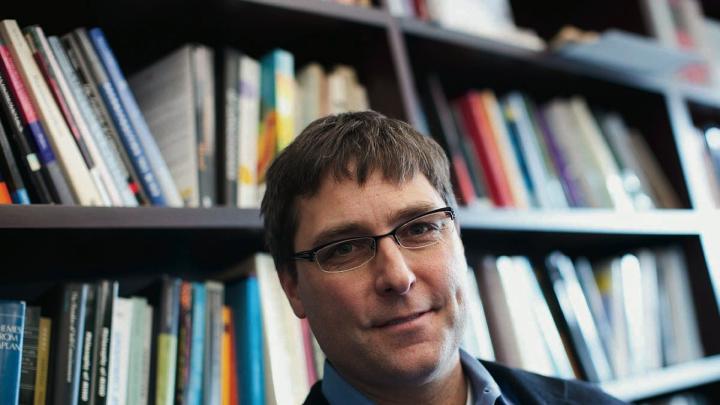Tough Grading for Gen Ed
The College’s flagship general-education curriculum came under sharp criticism when a faculty review committee released its report for discussion at the May 5 Faculty of Arts and Sciences (FAS) meeting. The requirement that undergraduates take eight general-education courses (one-quarter of their curriculum) is intended to assure that they acquire some breadth of intellectual exposure and grounding in ethical reasoning and the broader responsibilities of citizenship.
The review committee, led by Martignetti professor of philosophy Sean D. Kelly, found that whatever good intentions accompanied the enactment of general education in 2007 and its implementation in 2009, “in practice our program is a chimera: it has the head of a Gen Ed requirement with the body of a distribution requirement.” That is, it purports to be under the guidance of a principle or set of principles, but in practice permits students to adhere to those principles only nominally, with courses that “fail to manifest or even identify that philosophy.”
Among the disturbing things the committee heard during its fact-finding: some faculty members did not even know their courses satisfy general-education criteria, and students indicated that their course selections were guided by searching for low workloads and lax grading. Some 574 courses are now permitted to qualify for general-education requirements, meaning that many classes for concentrators have been grandfathered in, undercutting the rationale for distinctive offerings with a unique purpose. (For a student perspective, see The Undergraduate, in this issue.)
In the ensuing, relatively brief faculty discussion, several professors supported the rationale for general education, and for overhauling the program as it now exists to better meet its aims. A leader of the 2007 effort to create the program, Bass professor of English Louis Menand, observed, “Departments don’t normally generate courses for the nonspecialist, or that prepare students for life after college. That’s not their mission. But it is the mission of the college as a whole, which is to say of the faculty. A general education curriculum represents what the faculty believes are the things that every educated person should know, and the skills and habits of mind that every educated person should acquire.” At least one colleague, though, advocated replacing the “failed” general-education program with a simple disciplinary distribution requirement.
FAS is expected to return to the subject in the next academic year, but the schedule for debate and the possible courses of action remain unclear. For a full report, see harvardmag.com/gened-15.
Endowing Engineering
John A. Paulson, M.B.A. ’80, founder of a prominent hedge fund, has made a $400-million commitment to the School of Engineering and Applied Sciences (SEAS), the largest gift in University history. The school will bear his name. The unrestricted funds have the effect of bolstering the school’s endowment by 40 percent—giving its leaders the flexibility to pursue their plans to expand the faculty, enhance support for research, and underwrite graduate students, at a time when course enrollment is booming and the school plans to move many of its professors to a huge new facility that will anchor Harvard’s academic expansion in Allston. Paulson said he intended the gift to make the school “a twenty-first-century engineering leader,” while enabling strong future collaborations between SEAS and Harvard Business School in “a center of innovation in the sciences, engineering, and math.” His decision, he said, was driven by his desire “to help Harvard in the area that Harvard needed the help.” For a complete report on the gift, unveiled June 3 as this issue went to press, see harvardmag.com/paulson-15.

Photograph by Rose Lincoln/HPAC
John A. Paulson
Surveying Sexual Assault
Twenty-eight American Association of Universities members, including Harvard, have conducted a survey of their students regarding sexual assault, using a confidential questionnaire available online from April 12 through May 3. Such surveys are being encouraged nationwide in an effort to accurately measure the extent of sexual assault on campuses. The website informed students that “The survey says whatever you say it says,” and stressed that it was “Voluntary. Important. Confidential.” It was also, necessarily, very specific, asking respondents, for instance, whether they have been on the receiving end of “inappropriate or offensive comments”; “crude or gross sexual” remarks; unwanted phone calls or other communications; various stalking behaviors; physical abuse; nonconsensual or unwanted sexual penetration or oral sex; and so on. Students were also asked about their awareness and use of various sources of help, and their reporting behavior. President Drew Faust e-mailed students to encourage their participation—an outreach effort buttressed on April 30, after some 45 percent of them had completed the instrument, with a somewhat jocular video clip featuring Conan O’Brien ’85 urging the rest to complete the survey (and urging them not to Google his real age). Harvard and AAU aggregated data are to be reported at some future date.
Big Steps, Online
edX, the Harvard-MIT online learning partnership, announced in April a momentous agreement with Arizona State University, addressing head-on the issues of college costs, nonresidential learners, and credit for online courses. The ASU/edX Global Freshman Academy will offer anyone first-year university credit for completing a series of massive online open courses (MOOCs): a lower-cost, digital entry toward a college degree without residential-learning requirements, standardized admissions tests or transcripts, or formal applications. Completion of eight general-education courses taught by ASU faculty members will be deemed equivalent to a full freshman year on campus, “at about half the cost of the national average for a year of in-state tuition at public universities,” according to the announcement. Students who complete the requirements will be provided with transcripts for use in applying to two- or four-year institutions as sophomores; ASU will make no distinction between classroom and online courses.
Separately, in late April, Harvard Business School’s (HBS) HBX announced an agreement with Amherst College, the first in a series of such ties, to admit its students into the fee-based, 11-week, 150-hour online Credential of Readiness (CORe) program in basic business skills, and to coordinate applications with Amherst’s financial-aid office so students in need can qualify for more aid. In early May, similar agreements were announced with Carleton, Grinnell, Hamilton, Wellesley, and Williams: all pools of strong students who might be interested in CORe—and who might, in the future, want to pursue a full-fledged M.B.A. Harvard Law Schoolwill also offer the CORe sequence to its incoming students, and some current students, with the law school providing a subsidy to reduce the cost from $1,800 to $250.
The Extension Schoolreported that half its 694 courses during the 2014-2015 academic year were online; 26 courses piloted a hybrid model of online learning supplemented by intensive weekend sessions on campus. Eight HarvardX courses were offered for credit.
Underscoring the rapid advance of online-learning options, on the same day HBS unveiled its expanded ties with elite colleges, the University of Illinois at Urbana-Champaign offered a fully online iMBA degree, produced in partnershipwith Coursera, a for-profit competitor to edX. The total cost of a degree is about $20,000; full-time resident tuition is $22,000 per year, bringing the cost of a comparable two-year campus degree to nearly $100,000, including living expenses.
And in early May, four colleges that have joined edX—Colgate, Davidson, Hamilton, and Wellesley—formed a coalition of such institutions to collaborate on online learning. Their aims include sharpening their focus on the kind of liberal-arts (as opposed to research-university) teaching they prefer, in both online and hybrid formats, and sharing pedagogical resources among institutions. Other, similar schools may join, too.









